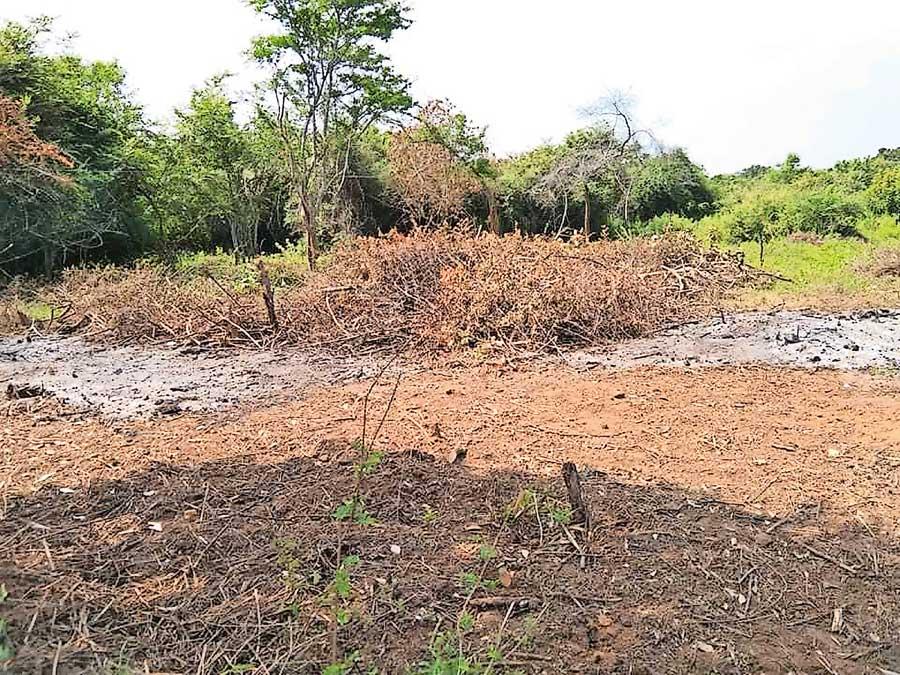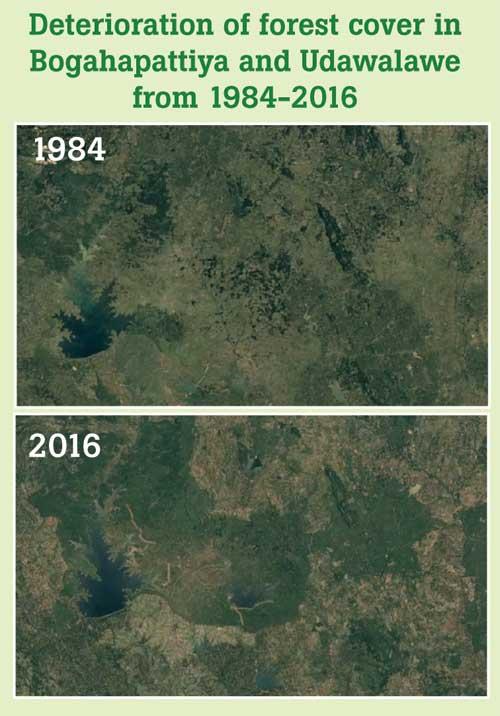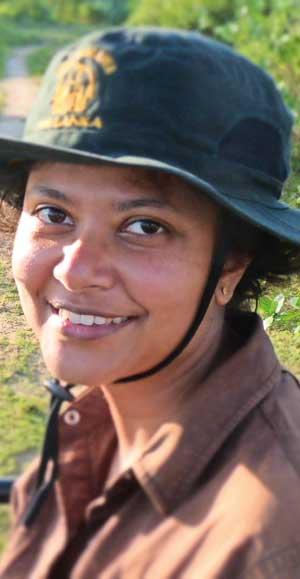Reply To:
Name - Reply Comment
Deforestation in Dahaiyagala

- President signals de-gazetting of Dahaiyagala Wildlife Sanctuary
- Electric fences of more than 4000km are largely ineffective
- DWC says only privately-owned lands within Dahaiyagala will be released
- Ecosystem services are provided by ecosystems, which are largely forested, undisturbed land
- A number of protected areas in the country are being encroached at alarming rates
- With this destruction the human elephant conflict will aggravate even more
Even though President Gotabaya Rajapaksa’s ‘Vistas for Prosperity’ promised to increase Sri Lanka’s forest cover in the next four years, environmentalists have raised concerns over several decisions that have been taken as of  late. During his visits to meet people in villages, President Rajapaksa has instructed the Department of Wildlife Conservation (DWC) and Forest Conservation Department (FCD) officers to resolve legal cases filed against people who have carried out farming activities in State forests and protected areas. Misunderstanding his directions, people in several areas have resorted to mass deforestation activities to clear lands and use them for agricultural purposes. Some of these lands lie within protected areas and DWC officers are facing a dilemma when it comes to protecting the environment while protecting their jobs. These events unfolded months after the 1/2005 and 2/2006 circulars, which provided protection to Other State Forests, were revoked.
late. During his visits to meet people in villages, President Rajapaksa has instructed the Department of Wildlife Conservation (DWC) and Forest Conservation Department (FCD) officers to resolve legal cases filed against people who have carried out farming activities in State forests and protected areas. Misunderstanding his directions, people in several areas have resorted to mass deforestation activities to clear lands and use them for agricultural purposes. Some of these lands lie within protected areas and DWC officers are facing a dilemma when it comes to protecting the environment while protecting their jobs. These events unfolded months after the 1/2005 and 2/2006 circulars, which provided protection to Other State Forests, were revoked.
It is against this background that the Daily Mirror sheds light on the ongoing environmental destruction in Dahaiyagala.
Deforestation at Dahaiyagala Sanctuary
 The Dahaiyagala/Dahaiyagala Wildlife Sanctuary (Tier IV) situated in the Monaragala district of the Uva Province was demarcated, declared and gazetted (as per Extraordinary Gazette No. 1239/28) on June 7, 2002. Lying amidst the Udawalawe National Park (to the south west) and the Bogahapelessa National Forest Reserve (to the north east) this Sanctuary also acts as an elephant corridor.
The Dahaiyagala/Dahaiyagala Wildlife Sanctuary (Tier IV) situated in the Monaragala district of the Uva Province was demarcated, declared and gazetted (as per Extraordinary Gazette No. 1239/28) on June 7, 2002. Lying amidst the Udawalawe National Park (to the south west) and the Bogahapelessa National Forest Reserve (to the north east) this Sanctuary also acts as an elephant corridor.
During a ‘Gama Samaga Pilisandara’ programme held on the banks of the Kukulkatuwa Lake in Thanamalwila, President Rajapaksa signalled his intention to de-gazette the Dahaiyagala Wildlife Sanctuary (Tier IV) which also serves as an elephant corridor. The conversation that took place between President Rajapaksa and DWC Director General Chandana Sooriyabandara is as follows:
President: What is the need to continue operations at Dahaiyagala as a sanctuary?
CS: Dahaiyagala to Bogahapattiya has been identified as an elephant corridor and therefore we realised that this area needs to be protected.
President: How can it be open for elephants when people are settled there? That is not practical.
CS: This was observed following an environmental assessment study carried out done during the Weli Oya project
President: Release lands of people who have deeds and re-gazette it.
Close to 400 acres cleared
When contacted, a DWC officer at Dahaiyagala said close to 400 acres have been cleared and it has been continuing. “With this destruction the human elephant conflict will aggravate even more.
Already the area is frequented by more than 500 elephants and this is a main elephant corridor between Udawalawe and Lunugamwehera National Parks. Elephants choose a particular route because they find food, water, shade and other resources.”
People won’t be able to grow crops on lands they clear : Dr. De Silva
“There are more than 1,000 elephants circulating around Uda Walawe and they need every bit of forest they can have,” said
they can have,” said
Dr. Shermin De Silva, Director of the Udawalawe Elephant Research Project. She is also the President and Founder of Trunks & Leaves Inc., - a non-profit organization focused on the conservation of Asian elephants and their habitats.
Following are excerpts of a brief interview:
Q Why is this area a sensitive ecosystem and therefore needs to be protected?
The corridor is a narrow stretch of forest that provides access to the larger forest area north of Uda Walawe known as Bogahapattiya. Although we call Bogahapattiya by this name, it does not itself have protected status in its entirety, being a patchwork of lands belonging to various parties. It is at a higher elevation, so it is cooler and has a very different biodiversity than what is found in the lowlands like Udawalawe itself. Access to these forests is important not only for feeding but also for the unique soils which elephants and other animals consume for clay and minerals. There are a number of these sites. While we can buy nutritional supplements and vitamins in a store, wildlife cannot. So they need access to these unique and precious resources which are of no value to us.
Q What would be the impacts of deforestation?
Pokunutenna is the nearest village that would be impacted and there is also Alutwewa adjacent to it. As you can see from Google Earth imagery, the forest connections between the larger Bogahapattiya area and Uda Walawe are already quite deteriorated and there is already severe human-elephant conflict. Clearing more forest will only increase it further. The villagers and politicians generally assume that elephants can be put behind fences, but there are more than 4,000km of electric fences in Sri Lanka and they are largely ineffective. There are more than 1,000 elephants circulating around Udawalawe and they need every bit of forest cover they can have. The people will not be able to grow crops on the land they clear, and it is misguided to think they will benefit at all.
Q If elephant habitats and migratory routes are changed, would the elephants have an alternative route?
It’s not quite accurate to call these “migratory” routes, because that suggests that animals use it periodically every now and then. That is a bit like calling the road between one’s house and supermarket a migratory route. Elephants need to move around, just as we do. They need to do it daily, weekly, seasonally. If you impede their movement by placing a barrier between two places they desperately need access to, they will go through it one way or another. The alternate route they create may not be desirable from our point of view.
Q What alternatives could be proposed without disturbing the environment so that farmers and land owners can have their properties while coexisting with animals?
First of all, there are a number of protected areas in the country, not just here, that are being encroached at alarming rates. That is simply illegal; there are no two ways of looking at it. The existing protected areas must be respected. Secondly, we should not have policies that directly encourage farmers to plant food crops right along those forest edges. That is where the conflicts are highest. We need to develop and promote other livelihoods. Tourism can be part of it, but unfortunately this industry is also responsible for destruction of natural areas. But the main issue is with our agricultural priorities. At the moment, our agricultural and irrigation policies encourage large private plantations and conflict-prone food crops. We need to diversify the agro-ecological resources that can be grown and marketed and support ways to transition away from food crops to other types of cultivations (e.g. sylviculture) and ensure that the economic development includes ordinary farmers rather than private corporations.
The President instructed to give away lands in a legal manner. But these people have resorted to illegal methods
- C.B Ratnayake
Legal action to be taken
“We have identified 12 suspects who have carried out deforestation at Dahaiyagala Sanctuary and legal action will be filed against them,” said Wildlife and Forest Conservation Minister C.B Ratnayake. “The President instructed to give away lands in a legal manner. But these people have resorted to illegal methods. We will therefore take actions as per the provisions mentioned in the Flora and Fauna Protection Ordinance.”
He also said that the President instructed DWC officials to see if it is legally possible to give away lands that are excluded from Other State Forests.
Consequences of short-sighted political gains
It does not appear that the political authorities comprehend that ecosystems provide services that are needed by humans for development
- Dr. Pilapitiya
Speaking on the downsides of short-sighted decisions taken at leadership level, Asian elephant expert and former DWC Director General Dr. Sumith Pilapitiya said the country has gazetted National Parks and other Protected Areas for a purpose. “It is to conserve the forests and wildlife species in the National Parks. But the purpose of conserving forests and wildlife species is not conservation for the sake of conservation. But it is conservation of these resources so that development can take place in the country,” he said.
Dr. Pilapitiya said development needs resources like water, fertile soils, proper climate and good weather. How does a country get such resources? These resources are known as ecosystem services. And such ecosystem services are provided by ecosystems, which are largely forested, undisturbed land. There is an abundance of scientific evidence which shows that higher the biodiversity of an ecosystem, the higher the ability of that ecosystem to provide the services needed for development. So the rational way to ensure sustainable development of a country is to protect its biodiversity and ensure that diverse ecosystems exist for the provision of much needed ecosystem services. For that, we need to protect our ecosystems, which include forests and biodiversity,” he said
“It does not appear that the political authorities comprehend that ecosystems provide services that are needed by humans for development. Even the most short-sighted politician should realize that without such ecosystem services, Sri Lanka’s development will be hindered. Therefore, ad hoc decisions made for short sighted political gain will hinder long term development of Sri Lanka. Arahat Mahinda’s quote which says that “rulers don’t own this land, they are only its trustees”, has as much or even more relevance today than it did in 306 BC. Peoples needs have to be met, but it should be done rationally otherwise the country’s development will suffer on the long term,” Dr. Pilapitiya added.
Contempt of court
The Wildlife and Nature Protection Society (WNPS) in a statement expressed their concern and distress about the purported decision made to de-gazette the Dahaiyagala Forest Reserve by President Gotabaya Rajapaksa, who had made this promise to the villagers of the area. “It is of the greatest concern because this Forest reserve is a gazetted forest reserve that serves as the key forest corridor for elephants and other mammals to enter the Uda Walawe National Park. Furthermore, there is a Supreme Court ruling on protecting this Forest reserve and if this decision to de-gazette is true, it is devaluing the order given by the country’s highest court and such a move is illegal. The key petitioners in this case are the Environmental Foundation Limited (EFL), WNPS and the Wilderness and Protected Area Foundation (WPAF). We have been reliably informed that the process of deforestation had begun on Sunday Jan 31st, 2021 and the process of deforesting is realistically a contempt of court. Without this forest reserve, the key iconic species such as elephants, leopard and other mammals will perish, reducing the numbers drastically, and upsetting status quo of environmental survival,” the WNPS said.
It said on top of being a key forest corridor for elephant and other animal movement, the result of deforesting the Dahaiyagala Forest Reserve will also see less elephants and other animals frequenting the Uda Walawe National Park, thereby depriving the tourism sector and related individuals and services of the tourism sector. “Jeep drivers, hotels and restaurants will all end up suffering with fewer animals on one of our key national parks, resulting in lower revenue. We boast of our country being one of the best wildlife destinations in Asia and such activity such as that of deforesting a key forest reserve only goes against the ethos of conservation and wildlife tourism. Sri Lanka enjoyed more that 35% of tourist arrivals for wildlife tourism prior to the Easter Sunday bombings and subsequently the COVID pandemic. With less wildlife to see, we will lose the key element of bringing back tourism for a sector that was nearly 1/3 of all our tourist arrivals,” the WNPS said.
President misled?
People who voice out their issues during their meetings with the President seem to be mouthpieces of local politicians
- Hemantha Withanage
“People who voice out their issues during their meetings with the President seem to be mouthpieces of local politicians,” said Hemantha Withanage, Executive Director at the Centre for Environmental Justice. “Our farmers cannot even maintain two to three acres. So how can they maintain hundreds of them? When local politicians fail to keep up to their election promises, they get clearance at leadership level so that their supporters can resort to illegal land grabs in protected areas. However if Dahaiyagala continues to be destroyed we will also file legal action. The President’s directions were to check on cases that have been filed against these encroachment issues and he did not ask people to resort to land grabbing, like how it is being done right now.”
Environmental organizations express concerns
Illegal land grabbing at Flood Plains National Park is another issue. On the one hand it is absolutely impractical
- Jayantha Wijesingha
With a common objective of speaking out against the ongoing environmental destruction, a collective of environmental organizations have aligned together to make an appeal to the President to stop the ongoing environmental destruction. “When we spoke to Wildlife Minister C. B. Ratnayake regarding Dahaiyagala destruction, he said he would take legal action,” said Jayantha Wijesingha, Convener of Rainforest Protectors Sri Lanka. “Illegal land grabbing at Flood Plains National Park is another issue. On the one hand it is absolutely impractical. There are more than enough paddy lands but their efficiency is minimal,” he said
The Daily Mirror also learned that the President is scheduled to visit Dick-Ella Kanda and Meemure which are two ecologically critical ecosystems.
President’s directions clear
“People have misunderstood President’s directions,” said DWC Director General Chandana Sooriyabandara. “His directions were clear. We will take action if they are clearing forests in the sanctuary. What the President told was to release settlements that fall within the sanctuary without destroying the elephant corridors and pathways used by animals. We will only do a change in boundary markings so that these settlements will fall outside the sanctuary and thereafter people can continue agricultural practices,” he said.